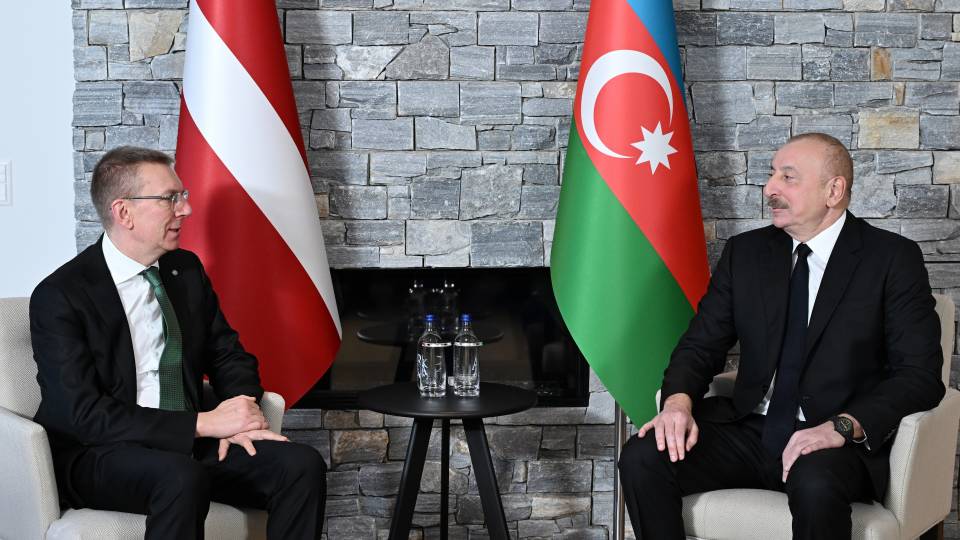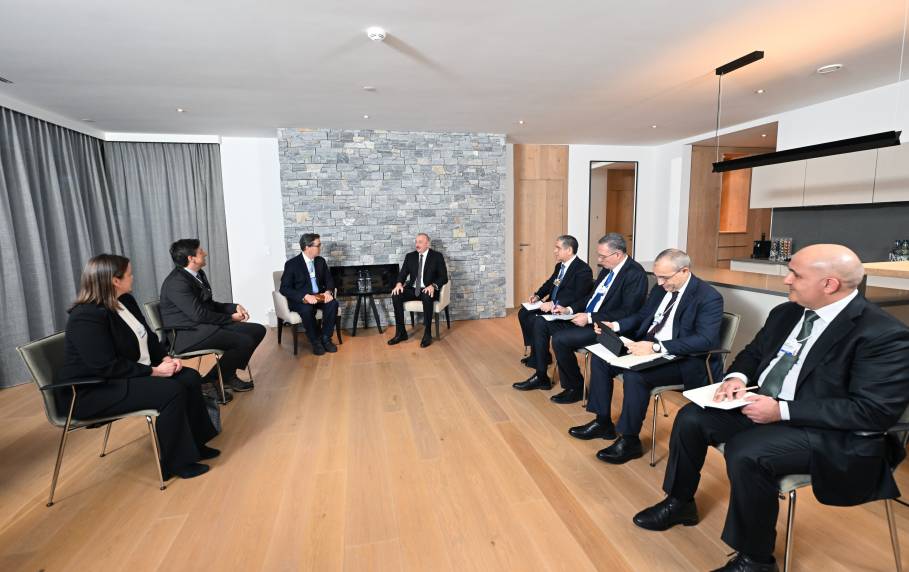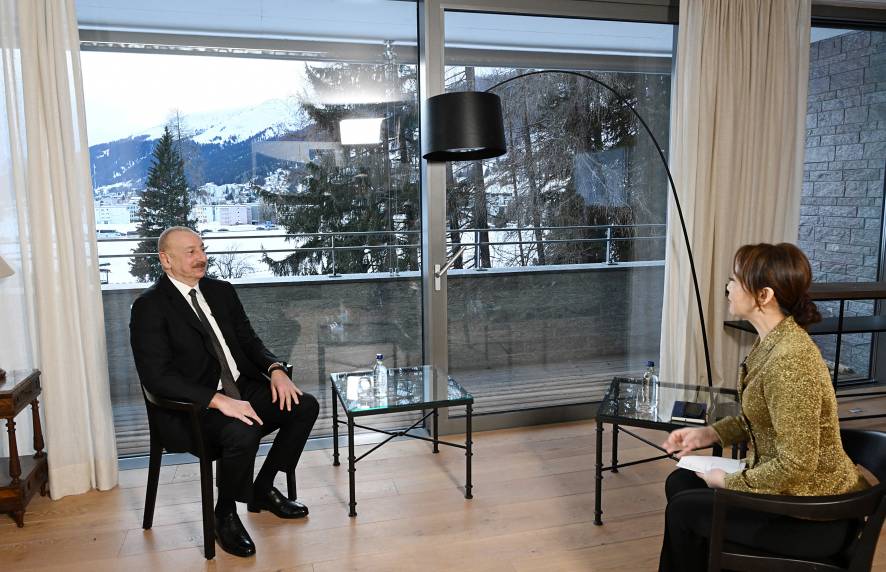20:28
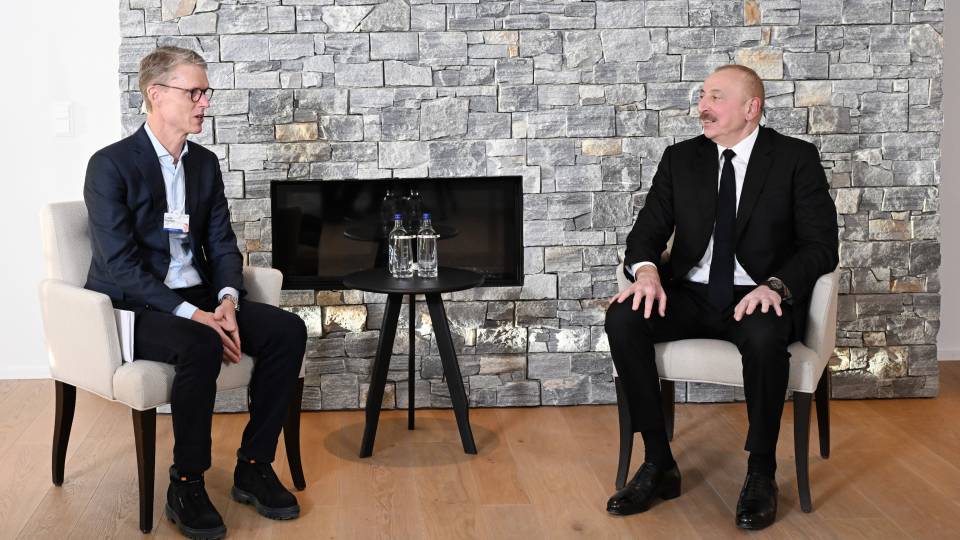
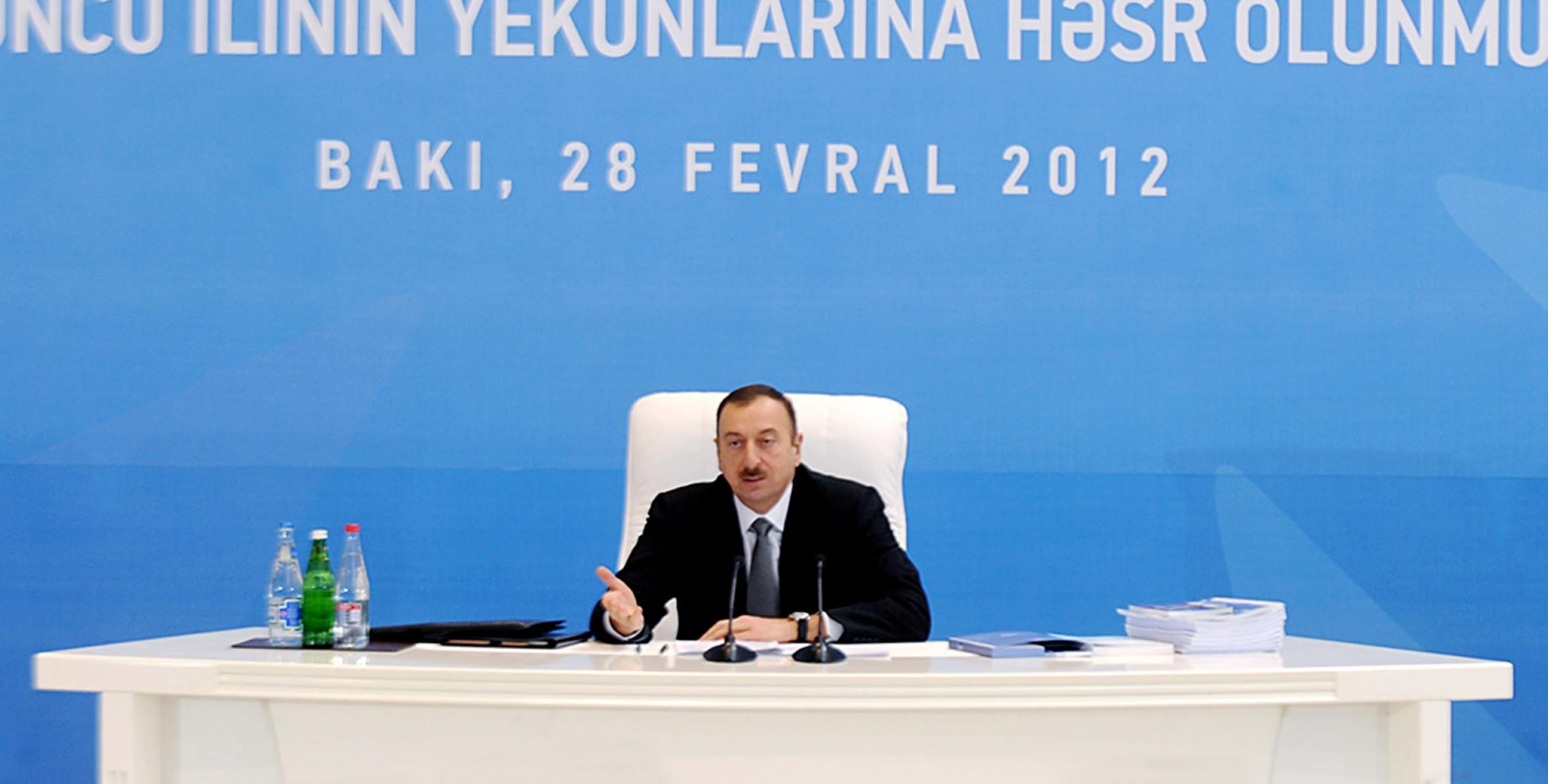
I am confident that all the issues provided in the state investment program for 2012 will be resolved. This year should also be successful for our country, in particular, we expect major development of the non-oil sector.
The projects started earlier and the ongoing ones are bearing fruit. In 2012 we will also open large enterprises and factories. So our non-oil capacity will be further enhanced. I want to repeat that there are all the possibilities for the development of private enterprise. Business people and heads of executive authorities have provided information about the processes taking place in the region.
I can say that we are witnessing an almost identical picture in each region and district. There is development, improvement, creation, social projects are implemented. In general, there is a lot of excitement. This pleases me a lot. I regularly travel to the districts, examine the situation and am always happy to see changes for the better. Our country has a great capacity and a great potential. This potential has been created due to the talent of the Azerbaijani people, and we need to make sure that all our tasks are met by government agencies and the private sector.
In recent years, the share of our private sector in the gross domestic product has been increasing. In general, our gross domestic product grows very rapidly. Over the past eight years it has tripled. No other country has ever achieved that. It is encouraging that the share of the private sector is also growing – it is now at the level of 83 per cent. This shows that Azerbaijan has long completed the transition to a market economy. Some time ago I said that we have alreadycompleted the transition period. Azerbaijan is no longer a country in transition. We are a country going through a period of rapid development, a developing country, and I want to reiterate that we will continue our policy to become a developed country.
As I mentioned in my opening remarks, a major public investment program will be realized. Seven billion manats is a huge amount. We need to make sure that this amount is used efficiently and all the projects work. There should be no backlogs. We must eliminate all the red tape. At the same time, there should be even more rigorous control over these major public projects. Where there is control, there is quality of work.
This year, as in previous years, major funds will be allocated for infrastructure projects, road construction in particular. Work is underway on the main roads. This year, as in the past, major investment started to be made in rural roads. We paid serious attention to this area in previous periods too.
But even more funds will be invested in this area, especially in 2012 and 2013. The construction of rural roads has been entrusted to local executive authorities. They should do the job with great efficiency and quality. This is tremendous responsibility because earlier this work was carried out by central executive bodies. But central executive bodies have other projects. They should focus on highways and inter-city roads. As for rural roads, local executive bodies know this job better. Even last year each district received orders, prepared reports and plans. As you can see, from the beginning of this year funds are allocated from both the state budget and the President’s contingency fund. The aim is to rebuild all rural roads. This, of course, is the ultimate goal.
At the same time, an actual goal has been set for the end of 2013, all calculations carried out and our financial and technical capabilities examined. Thus, 80 per cent of the rural population will be using beautiful roads by the end of 2013. This is what we can do now. If we can achieve further development, then we can amend this program this and next year. The goal is that 80 per cent of the rural population must use repaired and new roads. But the main goal, of course, is to bring all rural roads to order. We will achieve that goal.
The process of gasification is under way in the districts. The State Oil Company has received the necessary instructions. Although the State Oil Company is a large company, we provide it with all possible support. The public investment program provides for a large amount for the gasification of districts. There is another specific objective: to gasify 95 per cent of the population by the end of 2013. This is a realistic goal, and if we achieve it, I think we will resolve all the issues related to gasification. This issue requires major funds and technical capabilities. New lines are laid, the old ones are replaced. This process is under way both in the districts and in Baku. We need to move in two directions: restore the aging infrastructure established in previous years and in parallel with that create a new infrastructure. There are new technologies, new pipelines, there very durable lines, and we will use them.
I said in my opening remarks that among the infrastructure projects related to the implementation of the first program, we have paid more attention to energy supply. Although we are already self-sufficient in electricity, the issue is still relevant because the economy is growing, we have a strategic development plan, strategic views. We know that in 10 or 20 years from now, our economy will grow rapidly. The new enterprises, the new conditions for businesses are opening up excellent opportunities. So our demand and domestic consumption will continue to grow. Our energy capacity must exceed domestic consumption by at least 10 per cent. Although we have provided for our own energy security and are exporting electricity to other countries, we are currently implementing major projects. The biggest of them is the “Janub” power station in the city of Shirvan. It will have a capacity of 780 megawatts. This station should be commissioned this year. The “Shimal-2” station located in Shuvalan will have a capacity of 400 megawatts. Its foundation was laid last year and the station is to be commissioned next year.
This year we should put into operation the Fizuli hydro power station with a capacity of 25 megawatts. Next year we must commission a hydro power plant with a capacity of 25 megawatts at the Takhtakorpu reservoir. Along with the projects we started last year and those ongoing this year, the construction of small hydropower plants continues on small rivers. We have embarked on the development of renewable energy. Last year I attended the opening of the first such station in Gobustan. This is a wonderful experience, such projects have a good future. An enterprise manufacturing solar panels is already being set up in Azerbaijan. We must make better use of solar and wind energy. The construction of a new power plant with a capacity of 300 megawatts is planned in Baku. Perhaps we should carry out engineering design this year. The investment program for this year also provides funds for the restoration of power lines. A lot needs to be done in this area. Some transmission lines are in disrepair. Transmission towers sometimes collapse in districts, leaving villages without electricity. Therefore, “Azerenergy” has been asked to pay special attention to this area, assistance will be provided from the state budget.
Water supply and sanitation projects are ongoing. These projects were spoken about here. I want to say again: these are major social projects that require a lot of money. These projects require hundreds of millions, perhaps billions of manats. Baku, its suburban settlements, all our cities and district centers must have sanitation and drinking water, and the steps taken in this direction are encouraging. Ambitious goals have been set. But, I repeat, these goals must be realistic.
Of course, I would love to see these projects completed in all our cities and districts by 2013. But it is probably impossible. So the realistic goal is that water supply and sanitation projects must be completed in most our cities and districts by the end of next year. I think we will achieve this 100 per cent. Again, we will see. If we have extra financial resources this or next year, we must spend them primarily on water and sanitation projects. Then we may be able to do even more.
Water and sanitation projects are either already under way or are about to start in all our regions, in every district. Also, as mentioned here, the construction of modular water treatment plants continues in the villages along the rivers. According to my information, such facilities have been built in 188 villages. People used to drink water from rivers and canals, now they drink clean water, and the number of such people exceeds 300,000. Now 340,000 villagers already have such an opportunity. An instruction has been given to take further measures this year and beyond – we need to provide the population of villages along the rivers with clean water.
Land reclamation issues will continue to be in the spotlight this and next year. This has already been mentioned. Two major projects are ongoing. These are the biggest projects in this area. Possibly, the biggest non-oil investment across the country is channeled into this area. We are creating two large water reservoirs. In essence, we are creating large lakes – the Takhtakorpu and Shamkirchay reservoirs. Tens of thousands of hectares of new land will be covered. This will give a powerful impetus to agriculture. These projects require major funds. This is an investment in the future. This investment will not pay off immediately, this is not our goal. This investment will return in the form of additional crops, it will first benefit the farmers and then the state. So this is also huge private sector support, because our agriculture is completely controlled by the private sector, is at its disposal. So we will make no mistake if we view these projects as steps towards private enterprise development.
We will take further measures to develop agriculture. Quite serious programs have been adopted. New initiatives are being pursued in the area of crop production. I told last year's meeting that we must start creating major crop production farms. A year has passed, but there are no results. I know that this is a big and serious issue. We need to identify new plots of land, implement infrastructure projects, resolve irrigation issues. But I think we should pay more attention to that. I think that at a meeting next year we should be able to talk about initial successes, otherwise those who are indifferent to my instructions will be punished. Be aware of that. This is necessary for food security in our country. This is an excellent and timely initiative. It must be fulfilled without delay. I have instructed all relevant agencies regarding this, because this work should be duly coordinated. This work should be dealt with by all relevant agencies. Overall control will be exercised by the Cabinet of Ministers.
Major effort is made to develop animal husbandry. A total of 10 million manats was recently allocated from the contingency fund of the President to the Ministry of Agriculture, so that it could import more purebred cattle. This process has been ongoing for years. We will thus significantly improve our thoroughbred cattle. The imported cattle is highly productive, and we must strive to gradually set up large livestock and dairy farms. An entrepreneur from Agjabadi has spoken about that here. It is indeed Azerbaijan’s biggest dairy company. I am glad that it is already addressing livestock breeding issues. We need such businesses. After a while I will tell you to what extent our domestic production meets our needs. Special attention should be paid to dairy, livestock and crop production enterprises.
At the end of last year we adopted the State Program on the development of viticulture. This also demonstrates the government’s intentions. Last year I spoke extensively on the development of viticulture. Why viticulture was once destroyed in Azerbaijan – I have spoken about that and there is no need for repetition. This program demonstrates the priorities of the state. Of course, the private sector has always been and will always be engaged in this work. New vineyards are emerging, and we welcome that.
The goal of the program is to assist the private sector as much as possible, so that viticulture could develop and the wonderful tradition initiated by the great leader in the 1980s is revitalized. This is necessary both for the country's economy and, above all, for farmers. They know that the income earned in viticulture cannot be made in any other field. At the heart of this program is also private enterprise development and the desire to enable farmers and peasants to earn more and live even better.
We have initiated projects related to horticulture, particularly on the basis of modern technology. Last year I visited one farm in Guba District. It is an intensive gardening farm. Although Guba District is already noted for gardening and beautiful apple orchards, the new system may increase the yield several times. And this means additional revenue and more crops. So intensive gardening is also in the spotlight.
In general, we need to make broader use of modern technologies in agriculture. To this end, delegations were sent to countries that have achieved great development in agriculture in order to learn from their experience. We need to bring in the latest technology. Just as we import the latest technologies in construction, road construction, architecture and other fields, we must bring in modern technology in this field. Then the yield, even under the current land fund, will significantly increase. If we consider that, as I said, major land reclamation projects are implemented and tens of thousands, perhaps even hundreds of thousands of hectares of new land will be introduced, we can imagine the agricultural development conditions that will emerge.
Food security is important for each country. We have been dealing with that for several years. When we realized that we must rely on domestic production, our steps in this area became even more effective. The financial and economic crisis and the drought in some countries led to problems with grain a few years ago. Traditional suppliers banned exports. Despite signed contracts, grain imports were suspended. Then we thought that we should meet our needs not only in crop production, but also in every sphere through domestic production. And it is possible – we have great lands, hardworking people, government support. Therefore, food security, along with the energy and transportation security, is a very serious matter.
In the past we never provided ourselves with food. In Soviet times there was a common national economic complex and all major food commodities were delivered from other republics. Over a short time we managed to achieve a serious breakthrough. We haven’t yet achieved food security completely, although there is major progress. Now I want to provide some figures. Of course, we always keep this in focus and these figures determine the provision of loans through the National Fund on Entrepreneurship Support. We first need to provide loans to the areas where production could meet domestic needs.
So at present grain production accounts for 65 per cent of our needs. As a result of the measures to be taken, this figure will reach 84 per cent by the end of 2013. If it is 84 per cent, it will be a good figure, but not the limit. We provide ourselves with meat by 88 per cent. The forecast for 2013 is 95 per cent. Poultry is at 81 per cent now. Recently we allocated more loans for poultry, so production increased, and in two years, by the end of next year, should reach 92 per cent. Potato production is already at 102 per cent and will be 114. Fruit production is at 117 per cent, so there is an export potential. Melons are at 100 per cent, eggs at 77 per cent and should be 100 by the end of next year. Production of sugar is at 160 per cent. But it is also true that raw materials for sugar production are mainly imported. At the same time, local production is at 160 per cent and there is a huge export potential. Salt production in Azerbaijan is at 47 per cent and should reach 75 per cent.
Currently, the production of milk and dairy products accounts for 70 per cent of our needs, and by the end of next year this figure will be almost 80 per cent. Vegetable oil is at 65 per cent, butter at 50 per cent. This should also increase. These are basic food commodities. What do these figures show? First of all, they show that major progress has been made. The second conclusion is that the figures for the end of next year are based on reality. These are not just our intentions. This will be achieved through loans and as a result of new businesses to be put into operation. At the same time, the figures show that we still can’t meet domestic needs for some items. Perhaps it will take four to five years. But we must do it. Butter, vegetable oil and grain – we must provide that. Of course, while discussing our investment plans, we must put this table in front of us and proceed from that in securing out agricultural development.
At the same time, as in any field, we must look forward and know what will happen in 10 or 20 years. I hope that in 2015 we will provide ourselves with basic food commodities by 100 per cent. Loans will be granted, more land introduced, etc. What next? Then we must find new markets, supply even more products to traditional markets. I have asked the Ministry of Economic Development to start exploring for new markets. Right now, so that we are ready. In 2015-2016, we will have huge volumes of agricultural products to be exported. If we don’t export them, we can’t ensure agricultural development – the domestic market will be flooded. True, the population and the needs grow, but not in such great volumes. Our annual population growth is 1.5-1.7 per cent. So if we don’t access new markets, it will limit the development of agriculture. We must and do work on accessing new markets. Relevant agencies should work together to this end. We will replace imports and also access the markets of other countries with our exports. So the Ministries of Agriculture, of Economic Development and of Foreign Affairs should hold discussions on the subject. If necessary, a working group should be set up.
The number of our partners in the world is increasing. In my opening remarks I said that a growing number of states are interested in cooperating with Azerbaijan. We also want to expand our cooperation and take our products to traditional and new markets. In particular, we need to take our agricultural products to European markets. To do this, only a desire is not enough. For this, quality products must be grown. Our agricultural products, fruits and vegetables, are of high-quality and natural. There are no and shouldn’t be any chemicals in them. This is also a very important issue. We shouldn’t bend over backwards to increase the output, because this will compromise quality. We don’t want our fruits and vegetables to have an artificial taste in a few years, as is the case some countries – you don’t know what fruit or vegetable it is when you eat it. Therefore, we must preserve this naturalness, this quality, not increase output at the expense of quality. Now we have very modern processing plants, especially those built in recent years. They must comply with all certificates and standards. To access EU markets, we must create enterprises that have such opportunities. So it is a very serious matter, a matter not for today, but for the future. But if we don’t undertake it today, we will be late.
At the same time, we must and we will increase domestic production of construction materials. I would like to provide a few more figures. Currently, cement production in Azerbaijan meets 44 per cent of domestic needs, in 2013 it will be 75 and in 2014 a total of 125 per cent.
The new cement plants under construction in Azerbaijan will be commissioned and in two years we will have the capacity to export 25 per cent of cement. Where are we going to sell it? Now there is a struggle for cement markets. We know this ourselves. There are many companies trying to sell cement to us, asking us to buy from them. This is a reality. After addressing our domestic needs, we, of course, will not be buying cement abroad. When should we think about sales? Today! In 2014, this figure will be 125 per cent. We must build our work so that there are no problems in 2014.
In addition, we are commissioning large enterprises with government support. An aluminum plant producing 50,000 tons of high quality aluminum operates in Ganja. During the opening, I was told that this figure would reach 100,000 and 200,000 tons. Aluminum is in demand everywhere. There is no need to look for markets. But what should we do? We should create an industrial park under the Ganja aluminum plant. The private sector should join in this work. The government should allocate space, provide the infrastructure, while the private sector should produce finished goods. Of course, we can sell aluminum ingots, but it will be a half-hearted job. Why should we buy aluminum products abroad? We produce aluminum, so let's make finished products ourselves, sell them at home, stop imports and then start exports. Please take this issue seriously – both entrepreneurs and the Ministry of Economic Development. An aluminum-based industrial park should be established in Ganja.
The process of establishing an industrial park of the chemical industry has started. A large petrochemical complex will be built. “Azerkimya” has received the instructions and plots of land have been allocated in Sumgayit. We will succeed in manufacturing new finished products in the chemical industry too. The establishment of the chemical industrial park has already begun. In general, the process of establishing industrial parks is well under way. It is a positive process. The Sumgayit industrial park with about 10 enterprises is already in operation, thousands of jobs have been created, while finished products can be exported to any country. Another industrial park will be established under the waste disposal plant in Balakhani. Jobs will also be created there, and one branch will be covered by the Balakhani industrial park. So the process of industrialization I have repeatedly spoken about will receive a powerful impetus.
We need to take Azerbaijani companies to foreign markets. Currently, the State Oil Company is actively working abroad. We should try to help other public companies, the companies capable of operating in foreign markets. The opportunities of the State Oil Company are expanding. I believe that our flag carrier AZAL should access foreign markets, maybe consider buying another airline and organize work in some other countries. This will also be possible with government support. “Azerenergy” is busy with domestic projects now, which is natural, but there will come a time when domestic projects are over and the company will need to access foreign markets. Our State Oil Company has been managing gas networks of some countries. “Azerenergy” can also take steps in this direction. The Caspian Shipping Company should step up its foreign operations. At home, using the funds provided by the state, ferries, tankers and ships are bought. We can create a similar system abroad. This is something worth considering.
At the same time, we must also help private companies access foreign markets. Again, the Ministries of Foreign Affairs and of Economic Development should work together and give me a specific proposal. This is not the first time I have talked about it, but I see no real results.
Give me specific proposals. We have inter-governmental commissions with other countries. This issue should be discussed by these commissions. Partner countries should provide our companies with preferential treatment. We think it will be fair. Thus, we need to take private companies to external markets. Our banks are doing that and should do it even more rapidly. Why shouldn’t five or 10 of our banks work in other countries, not just one or two?! Why shouldn’t they be in leading positions there? The government, for its part, will support them. If need be, we will provide political and other support.
We are creating a major transport and logistical center in Azerbaijan. We have five international airports, the most modern aircraft fleet. The Heydar Aliyev International Airport is under construction, the new terminal building will be a unique architectural monument. New runways, an international sea port in Alat are under construction. It will be the biggest port on the Caspian Sea. The Baku-Tbilisi-Kars railway is a project implemented on the initiative and with financial support of the Azerbaijani state. It is under construction and hopefully will be put into operation next year. Thus, the ongoing regional projects will make Azerbaijan a logistical and transport hub of global importance. This is our wish, we are trying to achieve this and we will.
We have a favorable geographical location. But without the infrastructure, geographical location doesn’t change much. Our policy in this area is very correct. Roads, railways, air and sea transport. The Azerbaijani state allocates an enormous amount annually to buy ferries, tankers, aircraft, to implement the railway project, etc.
In general, when it comes to the future, I have already said this several times and want to say it again: of course, the second state program will be successfully implemented. I have no doubt that by 2013 all our tasks will be over-fulfilled. No-one should have doubts about that. We have defined our strategy and need to prepare a strategic development plan for the next decade – a strategic development plan covering 2013-2023.
Appropriate instructions have been given. I won’t go into detail now, I just want to define the goal again. The goal is that over the next 10 years, in 2013-2023, Azerbaijan must become a country with a high-income population. For the next decade we have to set the goal of doubling our GDP. This is a tall task, considering that our GDP has already tripled. Now we have to double the already tripled economy. We understand that it will be impossible to do that with oil and gas because we have reached a high level of oil production and it is unnecessary to further increase it. I think we need to maintain production at this level, so that our people could use it longer. But we can achieve this by means the non-oil sector. In 2013-2023, the joint activities of government and private entities will enter into a new phase. So a plan of joint activities of public and private entities must be developed.
Of course, we will adopt the state development program. A five-year program covering 2014-2018 will be adopted. At the same time, we need to elaborate the strategic directions of joint activities of public and private entities. We must bear in mind that our private sector is no longer what it was 10 years ago. Our private sector is sustainable and strong, and as a result of the measures to be taken in the future it will become even stronger. If the goals I have outlined are met – and they must be met – the private sector will become even stronger. So we need to double the GDP and turn Azerbaijan into an even more powerful country.
Our political influence and economic power are growing. This is seen by those who like us and those who don’t. There are quite a lot of those who rejoice in our successes. But there are forces that don’t like us, our detractors. They can be divided into several groups. First, our main enemies are Armenians of the world and the hypocritical and corrupt politicians under their control. The politicians who don’t wish to see the truth and are engaged in denigrating Azerbaijan in different parts of the world. Members of some parliaments, certain political figures, etc. who live on the money of the Armenian lobby. We know them all. There is no need to name them. This is one group. Another group includes those who don’t accept Azerbaijan’s independent policies. In other words, they don’t accept that Azerbaijan can pursue an independent policy. We do and we will pursue an independent policy. This policy, I want to repeat, serves the interests of the Azerbaijani people. It does not and never will serve the interests of anyone else. The interests of the Azerbaijani people are above anything else. We do and we will fight to protect these interests. The results and recent history show that we can succeed even alone.
The third group includes those who just envy us. The realities of Azerbaijan show that we are truly developing and achieving historic progress. Look what we have achieved in both political and economic spheres in recent years. I want to repeat that while the ratings of developed states are falling and some developed countries are on the verge of a default, Standard & Poor's has raised the credit rating of Azerbaijan.
The World Economic Forum in Davos, the world's most influential economic think tank, has placed Azerbaijan in 55th place in the world and in first place in the CIS for competitiveness. This is not an artificial nongovernmental organization that can say what it wants. The World Economic Forum is a renowned international organization, and this is its opinion.
Azerbaijan is a young and independent nation. Our independence is only 20 years old. But we are already a member of the world's leading institution – the UN Security Council. We have won this right in a difficult fight because we didn’t turn from our course, were fair and gained the sympathy of the world community.
A total of 155 countries supported Azerbaijan’s candidacy. When referring to “public opinion” and the “international community”, we need to remember this event. The international community is not a member of any organization. Any organization regardless of its significance or its members do not reflect the opinion of the international community. The international community means the United Nations where nearly 200 countries are represented. Of them, 155 supported Azerbaijan. This is our great political success, and we are already influencing global processes, having our say. On that historic day, the day we were elected a member of this structure, I said we would restore and uphold justice in the Security Council, and we will.
After that, Azerbaijan was invited to a meeting of G20 foreign ministers. What does this show? It shows that our country is very important for the world. G20 includes 20 countries, hence its name. Ten non-member countries were invited and Azerbaijan was one of them. Of the former Soviet Union countries, only Azerbaijan was invited. Can those who don’t like us remain indifferent to this? Of course not.
Besides, we live in one of the most beautiful cities of the world. Baku is one of the most beautiful cities in the world. It has always been the case, and now we have put so much effort to make our city even more beautiful. Plus, the success of our talented young people in the Eurovision song contest is the success of all the Azerbaijani people and our state.
The UN Security Council, the invitation to attend the G20 meeting, the high assessment Azerbaijan has been receiving from powerful economic entities of the world, the evaluation of Standard & Poor's, the victory in Eurovision – all this, of course, is a thorn in the side of those who don’t like us. Therefore, we should not be surprised when someone writes something somewhere or makes an acid look. We shouldn’t pay attention to that. This is natural. The main thing is that our success is comprehensive and it will be continued in all areas. I have no doubt about that.
Azerbaijan will become even stronger, and the best answer to those who write about us, about our country, authors of those defamatory articles is our reality, our work and success. Azerbaijan is a dynamic country. Azerbaijan is a strong country. The number of our friends is increasing. But there will always be those who don’t like us. But the fact that they are in our way can’t make us abandon the chosen path. Our path is one of justice. Our path is one of righteousness, development and progress. We are and will be going along this path successfully. Thank you!

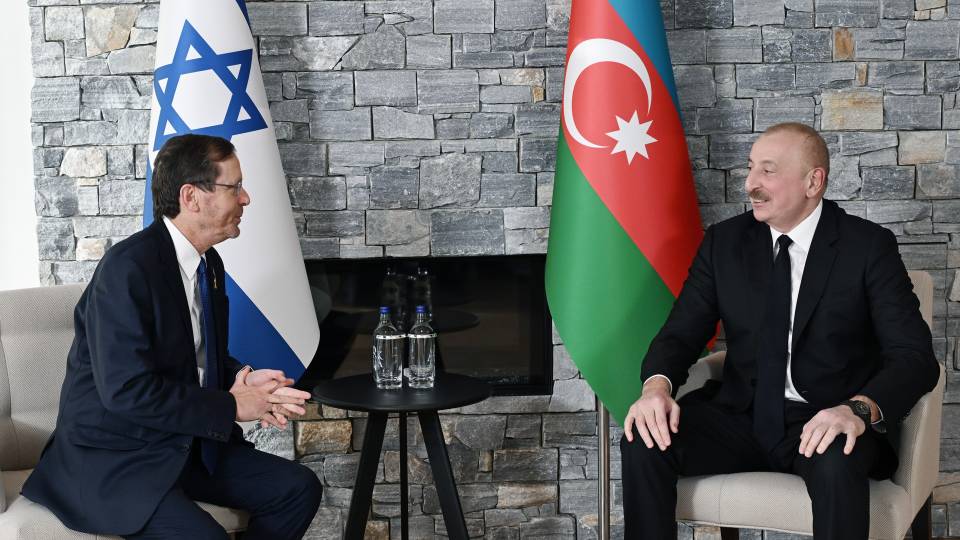
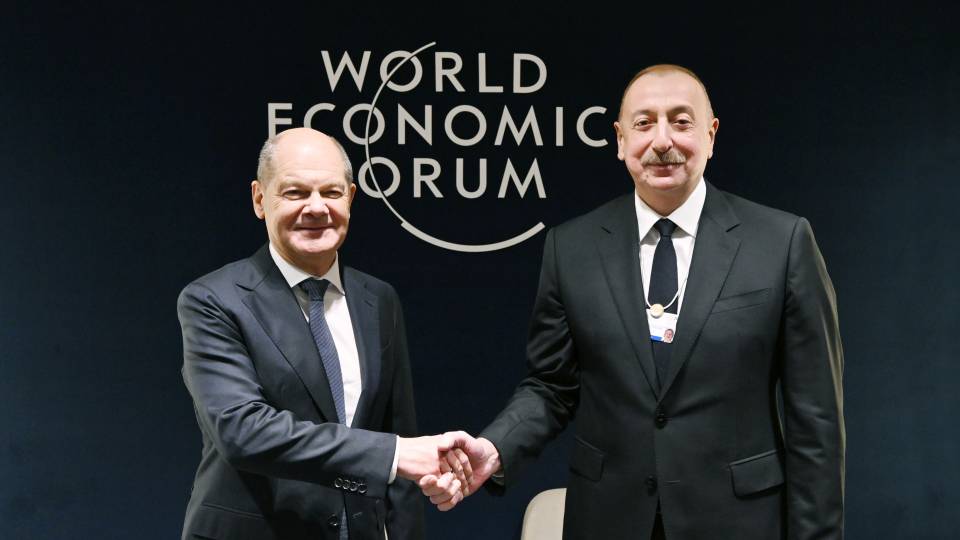
Dear Mr. President, dear Brother,
We are deeply shocked by the news of the fire at a hotel in the Kartalkaya resort in Bolu province, which resulted in the loss of many lives.
In light of this tragedy, I share your sorrow and extend my deep condolences to you, the...
21 January 2025, 17:33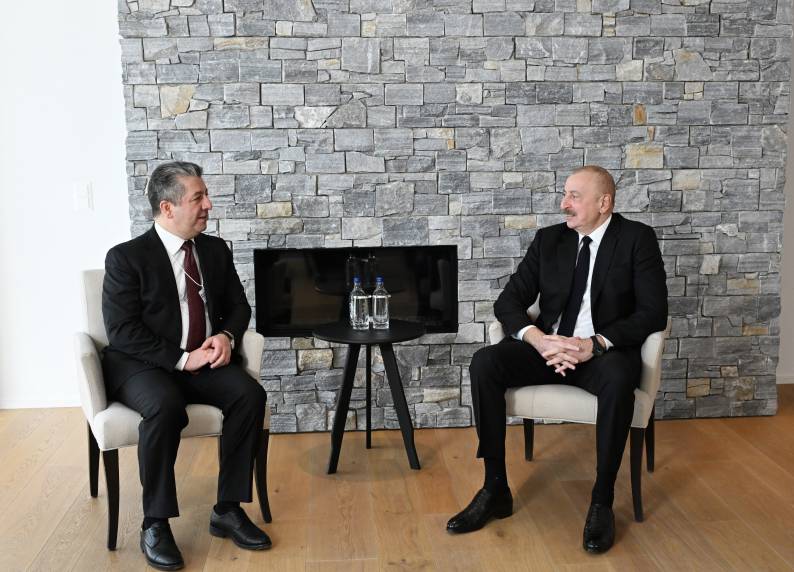
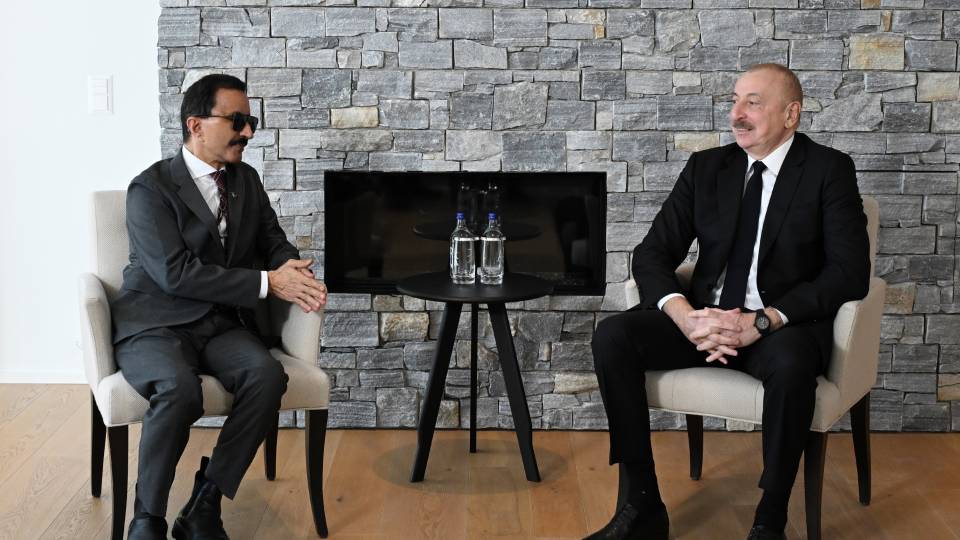
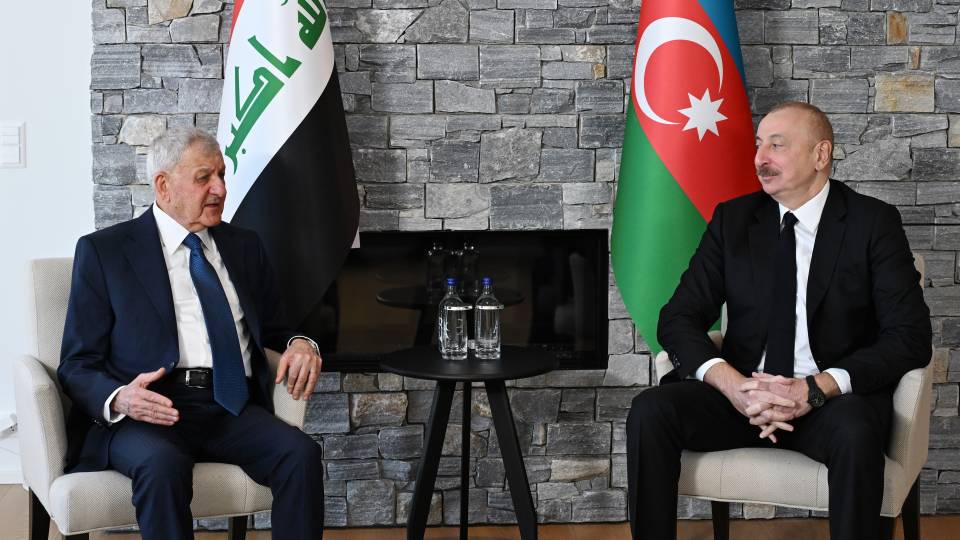
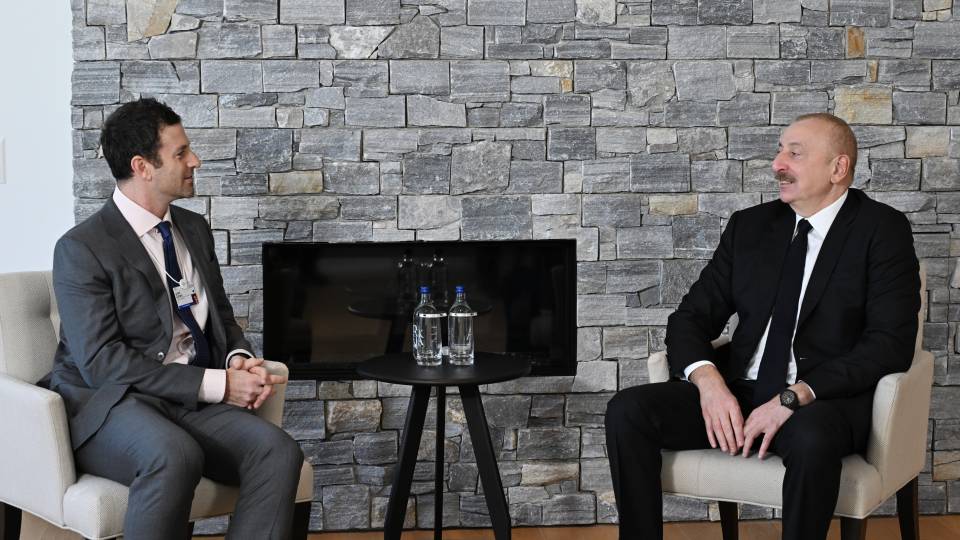
Dear Mr. President,
I am pleased to congratulate you on the commencement of your tenure as the 47th President of the United States of America, and I wish you success in fulfilling the duties of this highest office for the benefit of the friendly American people.
I...
21 January 2025, 13:13